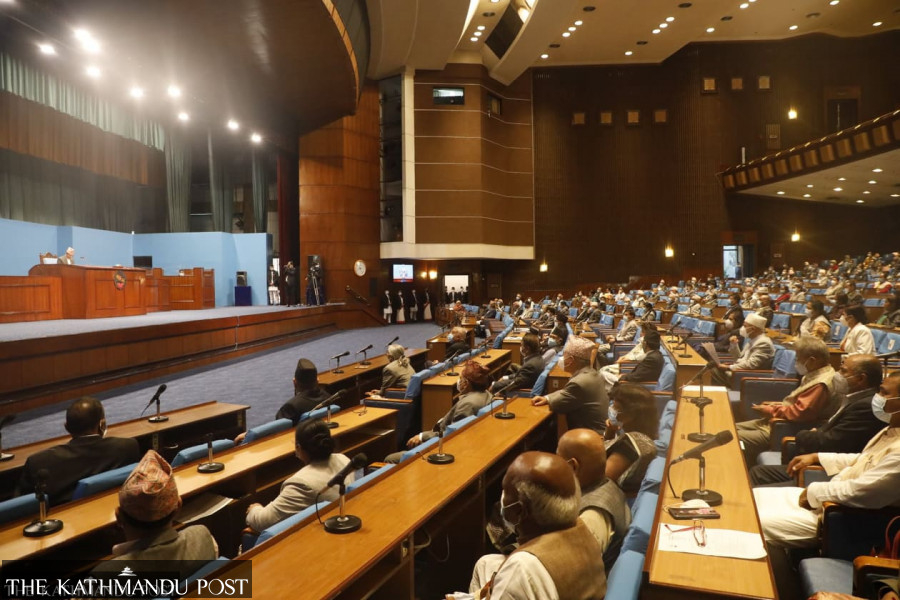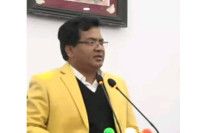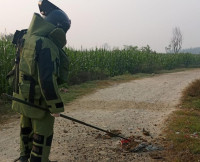National
Plan to table MCC in Parliament set to charge up politics
Deuba for moving the bill for its passage amid reservations from his coalition partners who want amendments to some clauses in the US grant agreement.
Binod Ghimire
The Millennium Challenge Corporation appears set to charge up Nepali politics, once again, as the government prepares to table it in Parliament for its passage, just as coalition partners continue to maintain their reservations.
Prime Minister Sher Bahadur Deuba, who recently reclaimed the Nepali Congress president post, has expedited consultations with cross-party leaders to what insiders say “create a conducive environment for tabling” the MCC, under which Nepal is supposed to receive $500 million in a grant from the US government.
Deuba on Friday held a meeting with Pushpa Kamal Dahal, the chair of Communist Party of Nepal (Maoist Centre), a key coalition partner in the current government.
Dahal has been saying the MCC compact cannot be endorsed in its present form.
During Friday's meeting, Dahal suggested that Deuba call an all-party meeting before tabling the MCC in the House for its endorsement, according to leaders.
“The party chair [Dahal] suggested that the prime minister call an all-party meeting to discuss the MCC before Tuesday's House meeting,” Ramesh Malla, chief personal secretary to Dahal, told the Post. “The prime minister has promised a meeting of parties.”
On Saturday, Deuba called an all-party meeting for 4pm Sunday.
“A host of issues, including House obstruction, the MCC and pending bills, is on the agenda,” Bal Krishna Khand, the minister for home affairs, told the Post.
The main opposition, CPN-UML, quickly responded, saying it will not attend the meeting.
“There’s no point in going to a meeting which has been called just for formality,” said a senior UML leader.
As far as Deuba is concerned, his position on the US grant is clear. He wants its swift ratification from Parliament. The Maoist Centre, as well as the CPN (Unified Socialist), the Janata Samajbadi Party and Rastriya Janamorcha—all of them Deuba’s coalition partners—however, have some reservations.
“Deuba wants to present the MCC for ratification at any cost. He is pressuring the ruling alliance for it,” said a leader of the Maoist Centre, on condition of anonymity. “Chairperson [Dahal], therefore, suggested for the all-party meeting.”
The Janamorcha has threatened to part ways with the alliance if the government tables the compact for ratification in the present form.
The CPN (Unified Socialist) has said it will oppose any move to table the MCC without amendments to some clauses.
“There will be a political clash if the prime minister pushes the MCC without a revision,” Jagannath Khatiwada, the party’s spokesperson, told the Post. “He will be solely responsible for it. The present document undermines national sovereignty.”
Some political parties and sections of the intelligentia argue that a clause in the MCC Nepal Compact supersedes Nepali law.
The MCC headquarters and the American embassy in Kathmandu, however, have clarified that the MCC is not above Nepal’s constitution.
At the time of the MCC’s signing in September 2017, Deuba was leading a coalition government, backed by the Maoist Centre.
After the 2017 elections, a communist government was formed under KP Sharma Oli, who was backed by Maoist Centre’s Dahal.
The erstwhile Oli government had owned up the agreement and registered it in Parliament in July 2019.
Oli and Dahal’s parties had merged to form the Nepal Communist Party (NCP), in which the American grant had emerged as a major divisive force. The NCP, however, was invalidated in March this year.
Oli on more than one occasion has blamed then-Speaker Krishna Bahadur Mahara for not taking the MCC forward in Parliament, apparently at the behest of Dahal, the Maoist chair. Mahara, a long-time Maoist leader and Dahal’s close ally, stepped down on October 1, 2019 following attempt to rape allegations.
The current Speaker, Agni Sapkota, is also a Maoist leader.
The Speaker’s role is crucial when it comes to listing the House agenda.
A senior official at the Parliament Secretariat said that on issues of serious concerns, the Speaker holds talks with cross-party leaders before including them in the day’s agenda.
“Minor bills are included if the government wants. However, that doesn’t apply to those that have long-term consequences,” said the official who spoke on condition of anonymity, citing the sensitivity of the matter. “Deciding the agenda for the House is his prerogative. The Speaker will definitely talk to cross-party leaders on the MCC.”
Whether Sapkota will agree to move the MCC for its endorsement depends largely also on what his political master—Dahal—says, according to individuals following the developments closely.
Dahal, many say, appears to have made a rod for his own back by vehemently opposing the MCC. Dahal wants to maintain his partnership with Deuba, at least until elections, but his support for the MCC could ignite a mutiny in his own party, as some leaders like Dev Gurung and Lilamani Pokhrel are objecting to the American grant’s endorsement.
According to one Parliament official, if an all-party meeting builds a consensus among the parties, the scenario could be different.
Though the UML wanted to ratify the compact when it was in government, its tone has changed after it was shunted to the opposition benches.
The party has been resorting to House obstructions. It has taken exception to Speaker Sapkota’s non-action on its decision to expel 14 of the party lawmakers, including Madhav Nepal, who went on to form their own party—CPN (Unified Sociliast).
Sources say Deuba has reached out to UML chair Oli also to seek support in endorsing the MCC.
“We won’t lift House obstructions for the MCC. The government, if it wishes, can endorse it like the bills related to the budget,” Khagaraj Adhikari, the party’s Standing Committee member, told the Post.
“The ruling alliance doesn’t need our help to endorse it as it already has the support of 165 lawmakers,” he added, referring to the number of votes Prime Minister Deuba had received on July 18 when sought the vote of confidence.
The compact can be endorsed by a simple majority in the 271-strong House. Four bills related to the national budget were endorsed in September, amid the UML’s obstruction, using marshals.
In a press meet on Friday, Shanker Pokhrel, the UML general secretary, said they will make their opinion public on the MCC once the government tables it in the House.
“Our focus is on Parliament now. The Speaker must give a way out to the present deadlock which was created because of him,” he said. “Either the Speaker has to take action against the lawmakers as per the UML’s recommendation or he should resign. Our obstruction will continue until our demand is met.”
Talks about the government preparing to table the MCC in the House also follow a meeting of the MCC Board of Directors in the United States on December 14 where the Nepal Compact was on the agenda.
“MCC Board of Directors received an update and discussed the progress to date of the $500 million Nepal Compact,” the MCC headquarters said in a statement on Saturday. “The Board of Directors made note of the commitment by the government of Nepal to seek to ratify the compact in the near term.”




 10.21°C Kathmandu
10.21°C Kathmandu















